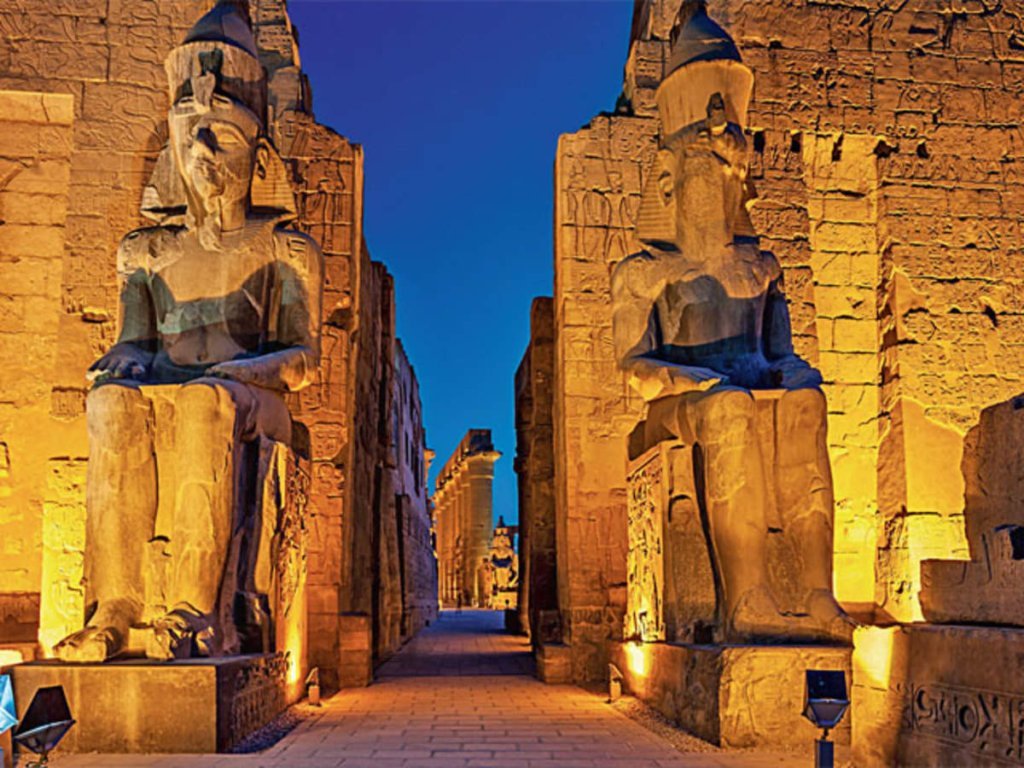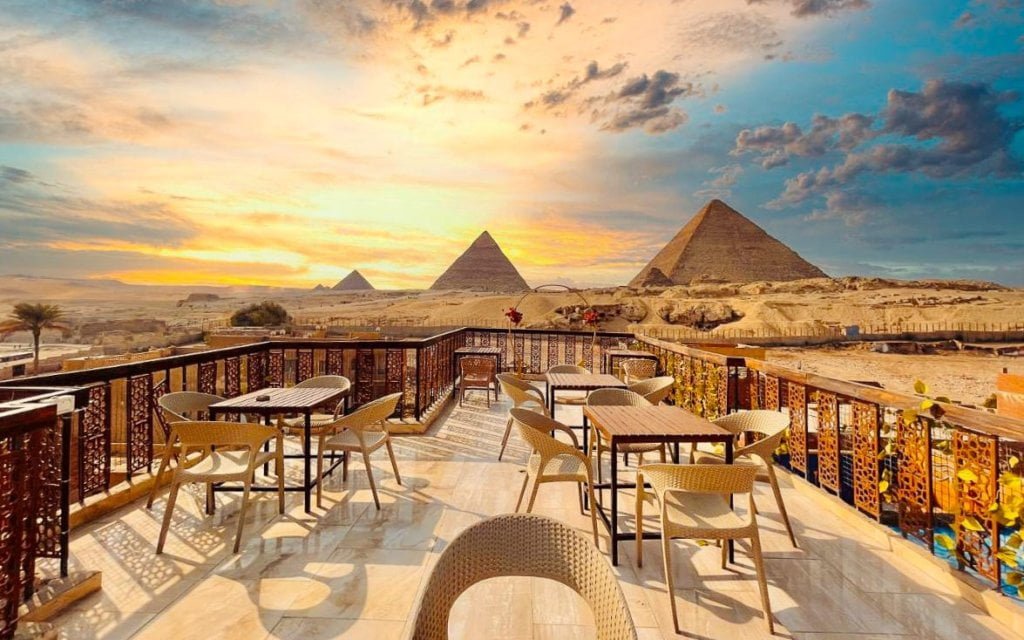Egypt is a country that conveys to mind the exotic. Mysterious mummies, Beautiful pyramids and lots of gold. That is what people perceives Egypt as. But it is so much more. There is Cairo; the most famous & ancient city, the river Nile, desert explorations, its temples and mosques and the general aura of history entrenched in the culture which saturates the entire country.

Terms & Conditions are apply | Personal appearance Not Necessary. | Visas Approval is subjected to Immigration. | We are not responsible in case of Visa is rejected / Delayed. | Visa fee is Non Refundable in any case. | Embassy Have the right to demand extra documents. | All payments made to be in advance.
Requirements
File including Guarantee & Tour Plan: 8000 PKR
Embassy Fee: 14100 PKR
All Passports
Copy Of CNIC
04 Pictures (35 x 45) With White Back Ground (Non-Glassy Paper)
Bank Statement 06 month with Closing Balance Not Less Than 350000/-
Bank Account Maintenance Letter
Company Letter Head 3 Copies Color (In Case Of Business)
Copy Of NTN (In Case Of Business)
Tax Return
Job Letter & Last 3 Month Salary Slips (In Case Of Job)
Nika-Nama-English)
B. Form (if age Less Than 18 Years)
FRC * Family Relationship Certificate ( In Case Of Family)
Student Bonafide Letter (In Case of Student)
Polio Vaccination Card
Dengue Report
Chamber card
Property/ Vehicle Ownership Documents (English Translated)
Visa Processing time 1 Month
Visa Validity & Duration of Stay: as per immigration13
Tour Guide Cities
Egypt is a country rich in history, culture, and natural beauty. Here are some of the top cities in Egypt:
Cairo
Cairo, the capital city of Egypt, is a vibrant metropolis that blends ancient wonders with modern life. Here’s a short description of Cairo:
Ancient Pyramids and Sphinx: Cairo is famous for being home to the Giza Plateau, where the iconic Pyramids of Giza stand tall. The Great Pyramid of Giza, the oldest and largest pyramid, is one of the Seven Wonders of the Ancient World. The enigmatic Sphinx, with the body of a lion and the head of a human, is another must-see attraction in Giza.
Egyptian Museum: The Egyptian Museum in Cairo is a treasure trove of ancient artifacts, including the world-renowned collection of Tutankhamun. It houses a vast range of exhibits, such as statues, mummies, jewelry, and hieroglyphs, providing a fascinating insight into the ancient Egyptian civilization.
Islamic Cairo: The historic district of Islamic Cairo is a UNESCO World Heritage site, known for its architectural gems and rich cultural heritage. It is home to stunning mosques, such as the famous Al-Azhar Mosque and the Sultan Hassan Mosque. Exploring the narrow streets of Islamic Cairo reveals hidden treasures, ancient structures, and bustling markets.
Coptic Cairo: Coptic Cairo is a district that holds significant religious importance for Egypt’s Christian community. It is home to ancient churches, including the Hanging Church (Saint Virgin Mary’s Coptic Orthodox Church) and the Coptic Museum, which houses a collection of Coptic artifacts, manuscripts, and artwork.
Khan El Khalili Bazaar: Cairo is renowned for its bustling markets, and the Khan El Khalili Bazaar is a must-visit destination. It is a vibrant and historic market where visitors can immerse themselves in the sights, sounds, and aromas of traditional Egypt. The market offers a variety of goods, including spices, textiles, jewelry, and souvenirs.
Nile River: Cairo is bisected by the iconic Nile River, which adds to the city’s charm. A cruise along the Nile offers breathtaking views of Cairo’s skyline and the opportunity to experience the river’s importance in Egyptian history and daily life.
Modern City Life: Beyond its ancient treasures, Cairo is a modern city with a bustling urban atmosphere. It offers a vibrant nightlife, a thriving arts scene, and a range of contemporary dining options. Visitors can explore modern neighborhoods like Zamalek and Maadi, which offer parks, restaurants, and cultural spaces.
Cairo is a city that encapsulates Egypt’s ancient past and its vibrant present. It offers a captivating blend of historical sites, cultural experiences, and modern urban living, making it a must-visit destination for travelers seeking a diverse and immersive Egyptian experience.

Aswan
Aswan, located in southern Egypt, is a city rich in history, natural beauty, and cultural heritage. Here’s a short description of Aswan:
Nile River and Islands: Aswan is situated on the east bank of the Nile River and is famous for its picturesque location. The riverfront promenade offers stunning views of the flowing waters, feluccas (traditional sailing boats), and nearby islands. Two notable islands are Elephantine Island, home to ancient ruins and a Nubian village, and Kitchener’s Island, known for its beautiful botanical gardens.
Aswan High Dam: One of the most significant engineering achievements in Egypt, the Aswan High Dam stands proudly on the Nile River. The dam controls the flow of the river and provides hydroelectric power to the region. Visitors can witness this modern marvel up close and learn about its impact on the surrounding areas.
Philae Temple: Situated on Agilkia Island, the Philae Temple is an ancient Egyptian temple dedicated to the goddess Isis. The temple was relocated to its current location due to the construction of the Aswan High Dam. It showcases stunning architecture, intricate carvings, and is a testament to the meticulous preservation efforts undertaken during the dam’s construction.
Nubian Culture: Aswan offers a glimpse into the vibrant Nubian culture, as it is home to a large Nubian community. Visitors can explore the Nubian villages, such as Gharb Soheil and Elephantine Island, where they can experience Nubian hospitality, colorful houses, and traditional handicrafts.
Unfinished Obelisk: The Unfinished Obelisk is an intriguing archaeological site in Aswan. It is an enormous ancient obelisk that was abandoned during its construction. The site provides insight into the techniques used by ancient Egyptians to quarry and carve obelisks.
Nubian Museum: The Nubian Museum in Aswan showcases the rich history, art, and culture of the Nubian people. It features exhibits on Nubian traditions, ancient artifacts, and the heritage of the Nubian region.
Abu Simbel: While not within the city itself, Aswan serves as a gateway to the awe-inspiring Abu Simbel temples. Located about 280 km south of Aswan, these temples are UNESCO World Heritage sites and were relocated to higher ground during the construction of the Aswan High Dam. The temples of Ramses II and Nefertari are renowned for their colossal statues and remarkable rock-cut architecture.
Aswan’s serene Nile River setting, historical sites, and vibrant Nubian culture make it a captivating destination. Whether you’re exploring ancient temples, cruising the Nile, or immersing yourself in Nubian traditions, Aswan offers a unique and memorable experience in Egypt.

Islamic Cairo
Islamic Cairo, also known as Historic Cairo or Old Cairo, is a district in the Egyptian capital of Cairo that holds great historical and cultural significance. Here’s a short description of Islamic Cairo:
Architectural Splendors: Islamic Cairo is renowned for its stunning architecture, showcasing the grandeur of Islamic art and design. The district is home to numerous mosques, madrasas (religious schools), and historic structures with intricate decorations, beautiful domes, and minarets. Notable examples include the Al-Azhar Mosque, one of the world’s oldest universities, and the Sultan Hassan Mosque, a masterpiece of Mamluk architecture.
Khan El Khalili: The bustling Khan El Khalili market is a vibrant center in Islamic Cairo, offering a traditional bazaar experience. It is a treasure trove of colorful shops, spice merchants, jewelry stores, and cafes. Visitors can explore the narrow lanes, haggle for souvenirs, and indulge in traditional Egyptian cuisine.
Al-Muizz Street: Al-Muizz Street, also known as Al-Muizz li-Din Allah Street, is a historic thoroughfare in Islamic Cairo. It is lined with beautifully preserved medieval structures, showcasing the architectural heritage of different periods, including Fatimid, Ayyubid, and Mamluk eras. The street is a pedestrian zone and offers an immersive journey through Cairo’s past.
Historic Mosques and Tombs: Islamic Cairo boasts a wealth of historic mosques and tombs. Apart from the Al-Azhar Mosque and Sultan Hassan Mosque, other notable sites include the Mosque of Ibn Tulun, known for its unique spiral minaret, and the Mosque of Al-Rifa’i, which houses the tombs of members of the Egyptian royal family.
Islamic Museums and Cultural Centers: Islamic Cairo is home to various museums and cultural centers dedicated to Islamic art, history, and heritage. The Museum of Islamic Art houses a vast collection of Islamic artifacts, including textiles, ceramics, and manuscripts. The Bayt Al-Suhaymi is a beautifully preserved historic house that offers insights into traditional Egyptian architecture and lifestyle.
Historic Gates and City Walls: Islamic Cairo features remnants of the old city walls and historic gates that once protected the city. The Bab Zuweila is a notable gate that offers panoramic views of the surrounding area from its minaret.
Sufi Traditions: Islamic Cairo is home to several Sufi lodges (zawiyas) and centers where visitors can experience Sufi music, whirling dervishes, and spiritual practices. The Sufi tradition is an integral part of Islamic culture and offers a unique spiritual experience.
Islamic Cairo is a captivating destination that preserves the rich Islamic heritage of Egypt. Its architectural marvels, vibrant markets, and cultural sites provide an opportunity to delve into the city’s history and experience the rich traditions of Islamic culture.


